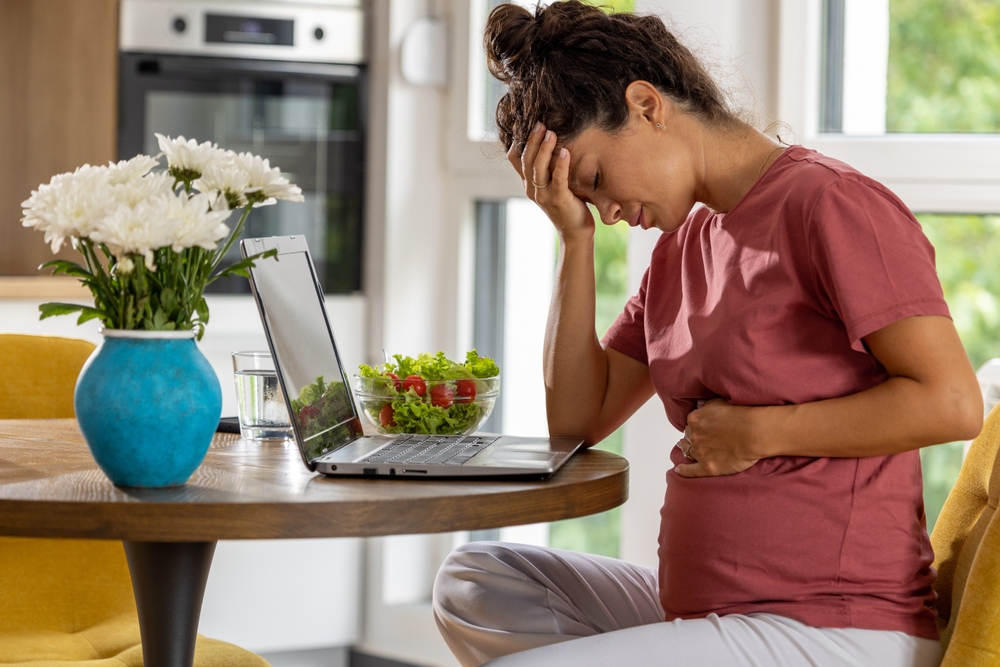Pregnancy comes with a myriad of wackadoodle changes that might make you want to cry all the time. Whether you’re dealing with swollen ankles, tender breasts, or pregnancy food aversions, chances are you’re struggling to get through the day without breaking down. What’s the tea on that?
Pregnancy food aversions might be one of the worst side effects of growing a baby. One day you’re happily munching on your favorite foods, but the next you’re throwing up at the thought of eating anything that resembles meat, eggs, or even dairy. On top of that, you’re hungry all the time.
Suddenly you shudder at the passing whiff of coffee. You frown at the thought of eating meat although you were an enthusiastic carnivore pre-pregnancy. You throw up at the sight of peanut butter although Reese’s peanut butter cups were the only snacks your boyfriend was allowed to buy for you.
With all the pregnancy cravings everybody’s always raving about, you didn’t even think about the likelihood of getting grossed out by the foods you used to swear by. You don’t even know how to explain to your own mother that you can’t stand the sight of the Thanksgiving dinner she worked so hard on.
Worry not, though, because you’re not the only one. Pregnancy food aversions are a common phenomenon and you’re not the only one who can’t figure out what to eat during those nine+ months of eating for two. Pickles? Popcorn? Pie? We’re bringing you everything you need to know down below!
What are pregnancy food aversions?

Starting with the obvious question, what even are pregnancy food aversions? Simply put, food aversions are defined by an intense dislike of a specific food or even food group.
Sure, you might not have enjoyed eating tomatoes pre-pregnancy anyway, but you might be surprised to notice you can’t stand the sight of some of your favorite foods, too.
When one of our co-workers was pregnant, she couldn’t stand the smell or the taste of coffee – the one thing everyone knew her for because she was a huge coffee drinker before she got pregnant.
She couldn’t believe that she could go a single day without a sip of coffee, but she went through her entire pregnancy sipping on tea and water. What was she supposed to do, right? When you notice that you get squeamish around certain foods and food groups, don’t get stressed out.
Food aversions might be annoying, but they’re a perfectly normal part of pregnancy. We do need to mention that your food aversations are probably going to be followed by food cravings, too. When do food aversions start, though?
When do food aversions start?
Now that you’ve figured out what food aversions are, you might be wondering whether you’re going to wake up with a strange aversion toward breakfast burritos and smoothies. Most people agree that aversions can start at any stage of the pregnancy, but they’re typically tied to the first trimester.
Moreover, that’s when most of the hormonal changes related to nausea and vomiting occur, too, which might be where the food aversions come from. More often than not, women who don’t get any food aversions during the first trimester end up getting off scot-free throughout the rest of pregnancy.
With that in mind, though, food aversions are the most intense during the second trimester. That’s when food cravings are the most intense, too, and that’s why you might get that feeling that you’re hungry at all times but that you can’t eat anything because you’re going to throw up.
Hang in there, momma.
What causes food aversions?

While most experts agree that the hormonal changes we mentioned beforehand play the biggest role in food aversions during pregnancy, we don’t really know why some women get pregnancy food aversions and others don’t. We’ve got theories galore, though.
Where do we even start? First and foremost, the hormonal changes with the increase in hCG result in nausea and vomiting which leads to food aversions. When you start getting sick, you might get the urge to vomit every time you’re around food. Foods that are your go-to might become the trigger, too.
Furthermore, your body naturally evolves to protect the fetus from possible pathogens or toxins and sends you different signals to ensure that you don’t eat anything that could harm you or your baby.
You might not think much of the fact that you suddenly can’t stomach steak, but your body knows what’s best for you. You can’t forget about the possibility that you’re body is trying to protect you from anything that could increase your chances of developing diabetes or preeclampsia, either.
Finally, food aversions might simply be a consequence of the changes in smell and taste that occur in pregnancy. You might notice that you’re suddenly repulsed by your husband’s perfume or that you can’t stand the smell of raw garlic without wanting to throw up. You can’t control these things.
Read also: Eating Ice Cream In Pregnancy: Is It Risky Or Safe?
What are the most common pregnancy food aversions?

Now, food aversions vary from person to person, but you’re probably going to end up with aversions to strong flavors or smells. Most food aversions are great conversation starters because they’re not that serious and will not, for the most part, cause harm to the person experiencing them.
When you start getting grossed out by different foods and smells, you’re going to be annoyed by the fact that you can’t seem to eat anything anymore. Moreover, you’re probably going to struggle with eating healthy and staying on the right track with meeting your nutritional and emotional needs.
Other than that, though, you’re going to be okay. What are the most common pregnancy food aversions you might experience? Some of the most common food aversions reported by pregnant women are spicy foods, greasy foods, salty foods, tomatoes, onions, garlic, meat, eggs, coffee, and tea.
5 tips and tricks on how to overcome pregnancy food aversions
1. Focus on the foods you crave and can eat
You and your baby need plenty of delicious and nutritious food to get through the pregnancy without complications. What are you supposed to do when you start experiencing food aversions from the get-go and you can’t get through breakfast without wanting to throw up?
Focus on the foods you crave and can eat, of course. Stop dwelling on the fact that you can’t scoff down a bowl of yogurt and your favorite fruit or that you can’t get the nutrients you need from your favorite type of meat. Chances are you’re experiencing food cravings, too, and that’s what you need to focus on.
Read also: Craving Sugar During Pregnancy: 6 Tips To Control The Urge
2. Avoid the foods that make you want to throw up

What a great way to end the conversation about food aversions, right? Whenever someone asks you “Why aren’t you drinking your tea? It’s so good for you!” or “Why don’t you want to eat more fruits and veggies? You know they’re going to help your baby grow!” – give them the silent treatment.
You need to focus on eating the foods that you crave and can eat because those are the foods that are going to get you through the day. You don’t want to spend most of your time throwing up, forcing down foods that make you sick, or drinking teas that make you nauseous for the rest of the day. You do you.
Read also: Craving Milk During Pregnancy: What Does It Mean?
3. Try eating smaller, more frequent meals
When you’re struggling with nausea, you might think that you’re destined to spend the rest of the day on the toilet. Worry not, there are things you can do to make the nausea go away. When you’re pregnant, your body goes through a bunch of changes and you might struggle with figuring out when to eat.
Try eating smaller, more frequent meals to ensure you’re never fully hungry. Women often complain that they’re even more nauseous when they’re hungry and when they haven’t had the chance to eat anything nutritious all day. Smaller snacks and meals are going to keep you full for longer.
Read also: The Real Reason Why You’re Craving Cheese During Pregnancy
4. Try to stay active
Working out during pregnancy might be a bit of a controversial take, but there’s no question of whether or not pregnant women need to stay physically active during pregnancy. Walking, swimming, or even doing light exercises can make you feel a million times better – especially when you’re nauseous.
Moving your body throughout the entire pregnancy can make you and your baby happy and healthy, and you might be a little more hungry when you’re done which can help with your pesky food aversions.
Read also: The Dos And Don’ts Of Craving Chocolate During Pregnancy
5. Water with lemon might help with your nausea

Drinking plenty of water during the pregnancy can make a world of difference for your pregnancy food aversions, too. We do urge you to talk to your doctor before you experiment with homemade remedies for nausea and vomiting because you never know whether you’re sensitive to some of the recipes.
Lemon water seems to have taken the Internet by storm and pregnant women around the world swear that they’ve seen significant progress with nausea and vomiting.

